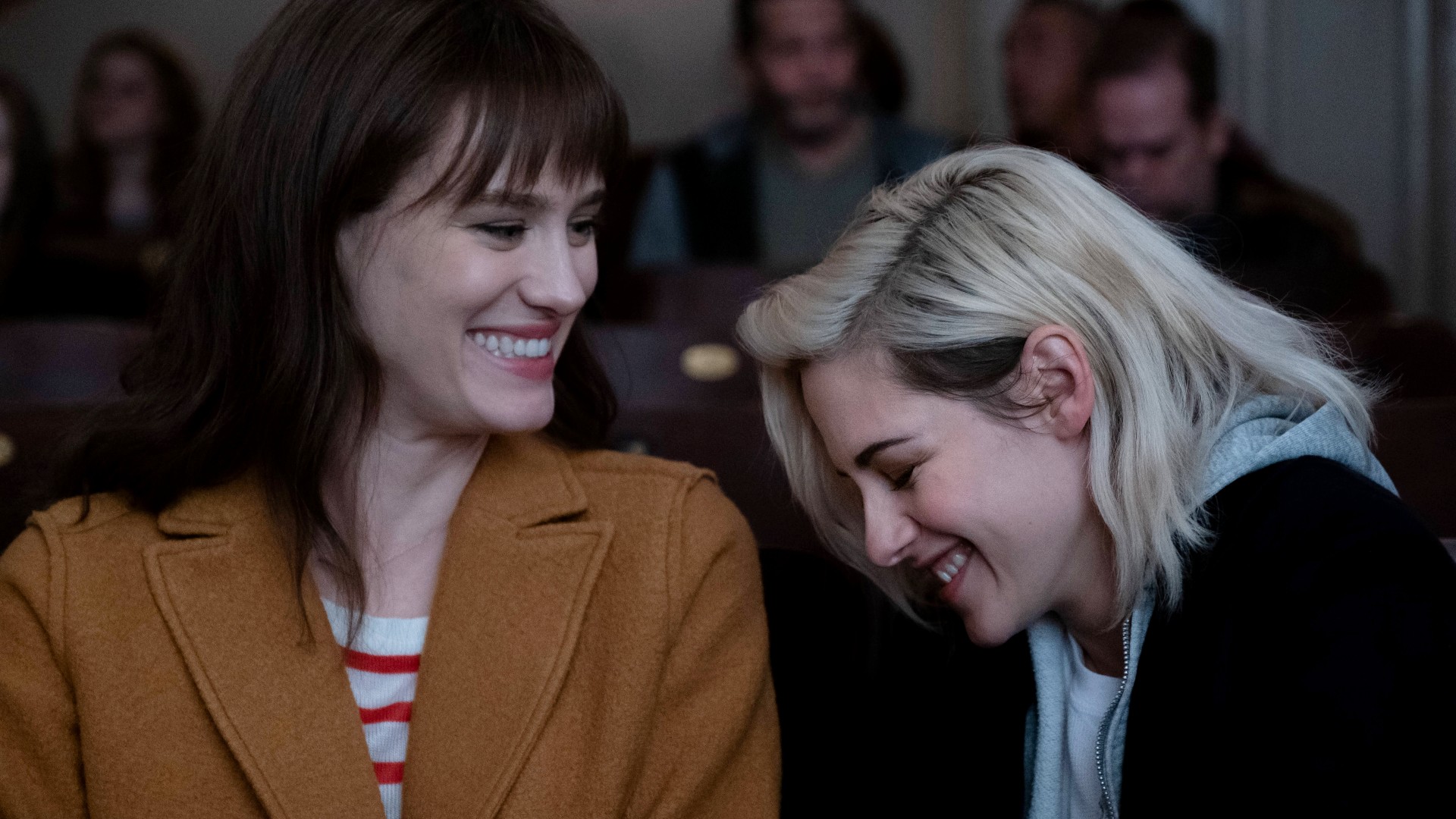My favourite time of the year is the lead-up to Christmas. Trees are trimmed, lights are hung, gingerbread cookies and candy canes are devoured. If you squint your eyes hard enough at night, the snow on the ground reflecting your obnoxious neighbour’s light-up inflatable Santa makes the cold, outside world feel like a fluffy blanket. Everything can be magical if you want it to be.
Christmas spirit is punctuated by a sense of togetherness—especially with family. Growing up, my Italian family gathered for feasts of seafood and pasta, mountains of gifts and singalongs to ’80s music videos. But for many years, before I came out, that meant a splintering of my identity: Celebrating with my biological family in favour of my chosen one, keeping partners at a distance while I held my relatives near. I couldn’t have both; the magic always sizzled out by the time Christmas Eve arrived.
So, in November, when the trailer dropped for queer actress and director Clea DuVall’s holiday movie, Happiest Season, I was decidedly in my feelings. The film’s protagonist, a journalist named Harper (Mackenzie Davis), decides to bring her doting partner Abby (Kristen Stewart) home for Christmas for the first time—except she hasn’t told her family she’s a lesbian, or that Abby is her lover. Hijinks ensue, but so do the harsh realities of returning home and going back into the closet in order to celebrate with family.
A coming-out story and a cheesy holiday rom-com formula don’t feel like a natural fit: The former can be painful, stressful, even risky; it’s also part of a never-ending cycle whenever you meet someone new. The other is easy to consume, cheerful with a tidy resolution. And yet, Happiest Season offered me an on-screen view of the first 20-odd years of my life—uncomfortable, awkward Christmas celebrations spent on the outskirts—with the happy ending all of us queers deserve.
The film is part of a larger proliferation of queer Christmas offerings this year. It comes after an anti-queer blunder from Hallmark Channel, the crème de la crème of saccharine holiday movies, which dropped a December 2019 ad featuring two brides kissing. The network’s response this year? Its very own gay holiday movie, The Christmas House. Netflix also unveiled its queer holiday showing, A New York Christmas Wedding, featuring two leading women of colour. Lifetime joined the mix, too, with The Christmas Setup—the network’s first holiday film with an LGBTQ2S+ main storyline. For the first time, queer people are being included in the overwrought, made-for-watching-in-your-sweatpants-by-the-fireplace corny Christmas specials—a rite of passage.
“Seeing myself reflected in Happiest Season gave me more holiday joy than I’d anticipated.”
But that representation goes a long way—and seeing myself reflected in Happiest Season gave me more holiday joy than I’d anticipated.
The plot mirrors DuVall’s own experiences—and Stewart’s, too. Autostraddle’s Heather Hogan visited the film set back in February, and both celebs admitted they’d walked in Harper’s shoes before. Sure, the discomfort of the closet shouldn’t be so relatable; but if we’re being honest, no collective experience ties us queers together more than coming out. And with a queer woman directing, and another queer woman playing a leading role, it feels real.
Don’t be mistaken: The film is imperfect in many ways. Harper often comes across as unlikeable; she can be short with Abby, despite having dragged her to her family’s home without revealing the nature of their relationship. But that’s because Harper is desperately holding on to a double life where she can satisfy both her own truth and the truth her parents want for her. It’s a feeling I sit with through most of my viewing; I’ve been a Harper too many times to count, forced to pick between familial and romantic love in situations where both cannot hold. And where Kristen Stewart’s acting might sometimes feel cold, it’s buyable, reminiscent of a partner so over the charade of loving and pretending not to.
But there’s a lot that Happiest Season gets right, too. Dan Levy plays John, Abby’s sidekick who offers the over-the-top yet sage advice of a gay BFF as well as a comedic release from all of Harper and Abby’s closeted tension. Abby is quick to befriend Riley (Aubrey Plaza), Harper’s high-school ex-girlfriend, in the most lesbian turn of events ever. And there are plenty of sexy sneaking-around make outs—this is a romantic comedy, after all. (Abby’s hair grows to the size of a lion’s mane by the end of it, which is a nice touch.)
“It’s mushy-gushy realness, including the ugly parts.”
Yet, somehow even better than an on-screen K Stew make-out session is the film’s depiction of those awkward family gatherings when you’re still trying to inch your way out of the closet. Harper’s mother, Tipper (Mary Steenburgen), desperately wants her to reconnect with her preppy high-school boyfriend Connor (Jake McDorman), so she covertly invites him to dinner one night, much to Harper’s embarrassment. Meanwhile, Harper’s father Ted (Victor Garber) is launching a mayoral campaign and needs his daughter to appear perfect—or, at least, “traditional.” All the while, Abby stands in wait—the orphan pity-invited to Christmas with Harper’s family. She watches from the periphery, not quite part of the brood. And it aches to watch—particularly when Harper’s sister Sloane (Alison Brie) glides in fearlessly with her husband, Eric (Burl Moseley).
Without spoiling the end, that ache eventually dissipates. But the fact that it exists at all is part of what makes it such a wonderful film. Christmas is often such a fraught time of year for LGBTQ2S+ people, and Happiest Season does not ignore this. Instead, it leans into the discomfort and offers a few laughs in solace. It reminds us that, at the end of the dark tunnel that is an anxiety-ridden family gathering, there can be light—even if it’s a stupid twinkle light strung up on a snow-topped roof. It’s mushy-gushy realness, including the ugly parts.
I came out to my dad when I was 21, and the following year my partner joined us for Christmas for the first time. She ate the seafood and pasta that my grandmother prepared, and opened her gifts on the living room floor next to me. For all the years I’d wished for the person I love to join me in my holiday traditions, the moment didn’t feel all that monumentous; it felt like it should have always been this way. Watching Harper and Abby, I was reminded not to take that feeling for granted and, rather, to embrace the magic—after all, bah humbug it doesn’t last.
Happiest Season is streaming on Hulu (in the U.S.) and is available to rent from eOne Films (in Canada).


 Why you can trust Xtra
Why you can trust Xtra


